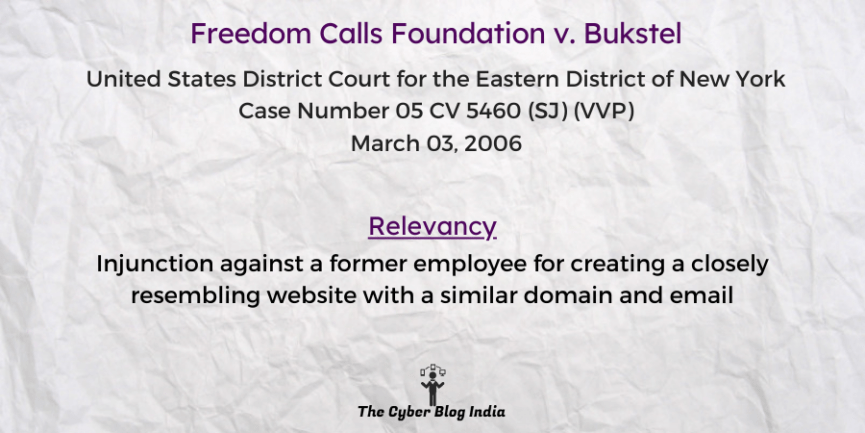Freedom Calls Foundation v. Bukstel

Freedom Calls Foundation v. Bukstel
In the United States District Court for the Eastern District of New York
Case Number 05 CV 5460 (SJ) (VVP)
Before District Judge Sterling Johnson, Jr
Decided on March 03, 2006
Relevancy of the case: Injunction against a former employee for creating a closely resembling website with a similar domain and email
Statutes and Provisions Involved
- The Federal Rules of Civil Procedure (Rule 15(a), 65))
- The Lanham Act, 15 U.S.C. § 1051
Relevant Facts of the Case
- The defendant was a co-founder of Freedom Calls Foundation, a charitable corporation. He registered a domain name similar to the one the corporation was initially using and created a website with content closely resembling the plaintiff’s official site.
- This act allegedly constituted misuse of the plaintiff’s trademarks and trade secrets, including a Supporter Client List.
- Upon discovering the defendant’s website, the plaintiff issued cease and desist letters and terminated the defendant’s employment.
- The plaintiff filed a lawsuit on November 18, 2005, with multiple causes of action.
Prominent Arguments by the Counsels
- The plaintiff’s counsel argued that:
- Despite the termination, the defendant’s website remained active, and they continued to contact supporters and clients via a similar email address.
- The defendant’s use of trademarks in various online domains constitutes unfair competition under the Lanham Act.
- The defendant’s counsel argued that
- The plaintiff has not demonstrated that any support has been withheld or that clients have withdrawn their support. Hence, there was insufficient evidence of injury.
- The Supporter Client List, which is the subject of this case, is not a trade secret. The plaintiff had already made it public.
Opinion of the Bench
- The plaintiff’s marks likely acquired secondary meaning. Hence, they have protection under the Lanham Act.
- The court can presume irreparable injury under the Lanham Act.
- The plaintiff had not produced credible evidence that the defendant most likely acted maliciously concerning cyber squatting.
Final Decision
- The court granted a preliminary injunction on the plaintiff’s motion for unfair competition and cyber squatting while rejecting the defendant’s motion for a temporary restraining order.
Aditi Mangesh Sawant, an undergraduate student at NMIMS Kirit P Mehta School of Law, Mumbai, and Khilansha Mukhija, an undergraduate student at the Institute of Law, Nirma University Ahmedabad, prepared this case summary during their internship with The Cyber Blog India in January/February 2024.
